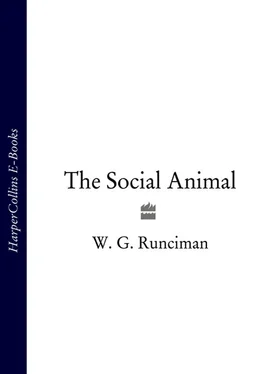Then what, in all this, about the philosophers, preachers and poets? Don’t they offer both explanations and descriptions of patterns of human social behaviour as valid and authentic as those put forward by academic social scientists? Well – nothing stops them. Nietzsche’s writings, to take a celebrated example, contain a number of sociological conjectures about the evolution of human nature for which he himself claimed ‘scientific’ status, including his view of systems morality as expressions of sublimated feelings of resentment towards those with power on the part of those without it. But Nietzsche wasn’t setting out systematically to test a set of explanatory hypotheses against the evidence most likely to conflict with them. He was, for his own very different purposes, constructing a just-so story about the ‘genealogy of morals’ and using it to subvert the conventional view of what human beings are doing in passing judgement on each other’s behaviour at all. The writings of philosophers, preachers and poets are sociology to the extent that the authors make them so. Some of the most potent intellectual cocktails yet mixed, like Freud’s, derive their potency precisely from the cunning, not to say dangerous, way in which they combine the two: would-be therapeutic regimes derived from a psychoanalytic theory which fails the standard tests to which new therapeutic drugs are routinely subjected may turn out to do more harm than good. But the difference between the kinds of conclusions to which the reader is asked to assent is still the same. It isn’t up to you or me whether Sahlins or Obeyesekere is right about the Hawaiians’ reception of Captain Cook, even though our respective ideological presuppositions may lead us to hope and expect that it’s the one rather than the other. But we do have, and will continue to have, a further element of discretion in deciding whether or not we share Nietzsche’s unflattering view of the Christian conception of morality, even after every item of relevant evidence is in.
To emphasize the difference as firmly as I have been doing is not – repeat not – to question that to analyse it is a philosophical rather than a scientific exercise: the philosophy of science is a branch of philosophy, not of science. So when the French philosopher and literary critic Jacques Derrida, in his book On Grammatology, announces to his readers that the nature of the difference between a philosophical and an empirical question isn’t simply an empirical question, the (or at least, my) surprise is that he feels the need to italicize it. 21 Who is he contradicting? There is always scope for argument over the borderline. But no contemporary sociologist or philosopher holds that the conceptual distinction between conceptual and empirical questions is ‘simply empirical’. Likewise, when textbooks on the philosophy of social science correctly insist that social scientists themselves are both its subjects and its objects, who wants to say otherwise? The question is: what follows? And the answer is that although social scientists are on that account exposed to the risk of making mistakes of a kind which doesn’t arise at all in the study of inanimate nature, it doesn’t prevent them from formulating explanatory hypotheses about their own and other people’s behaviour which can be tested by the same criteria of validity. Empirical sociologists talking about facts and their causes are apt to be denounced by their more philosophically minded colleagues as ‘positivists’. By this, the anti-positivists usually mean to imply a nefarious commitment to an ideology of science which denies the truism that the practice of science raises some genuinely philosophical issues. But when they come to attack the empiricists’ specific conclusions, you can bet that they will tacitly acknowledge the existence of empirical criteria by which observations of, and hypotheses about, patterns of human social behaviour stand and fall. Or if they persist in maintaining that all ‘social facts’ are ‘ideological constructions’, you need merely ask them whether, if charged by a court of law with a murder committed by somebody else, they would accept that their innocence was only an ideological construction (which the concept of ‘murder’ as an act of intentional, wrongful killing self-evidently is), and not in any sense a ‘fact’.
There is, to be sure, nothing self-contradictory in doing both. All students of human social behaviour, whatever label they attach to themselves, are free to draw on whatever empirical observations they like in order to persuade their readers to share their personal convictions about the human condition, the meaning of history, the phenomenology of the life-world, the postmodern experience, the contradictions of rationality, the dualism of knowledge and action, the existential dilemma, the ontology of social life, the paradox of reflexive subjectivity, and so on and so forth. The sociologists of the kind whom their opponents denounce as ‘positivists’ are apt to be no less contemptuous of those whom they in their turn denounce as practitioners of ‘substitute religion’. But each is as legitimate an intellectual activity as the other. The two are not in competition except in the trivial sense that professors giving lectures of the one kind may be competing for student audiences with professors giving lectures of the other. One of the most influential contemporary practitioners of ‘substitute religion’ is the German philosopher Jürgen Habermas, whose ambition (if I understand him correctly) is to formulate the ideal conditions under which rational human beings could communicate with each other free of the constraints imposed by ‘positivist’ social theory and the social institutions which it reflects. It is, in my judgement, a heroic but ultimately self-defeating intellectual enterprise. But whether my judgement is right or wrong, it’s an enterprise as fundamentally different as Nietzsche’s is from seeking first to distinguish and then to explain the different patterns of human social behaviour to be found in the historical and ethnographic record and then, if the researcher is so minded, to describe what they have been like, subjectively speaking, for the people whose patterns of behaviour they are. The only kind of philosophical argument to which this book stands categorically opposed is one which seeks to deny that empirical sociology is possible at all. But that sort of argument is best countered simply by doing what the sceptic says can’t be done; and, as I’ve hinted already, you will find even the most anti-positivist practitioners of substitute religion doing it too, where and when it bolsters their arguments of the other kind.
III A Catalogue of Errors
IF SOCIOLOGY IS AS OLD as Herodotus and Aristotle – to say nothing of Herodotus’s Chinese contemporary K’ung Fu Tzu, otherwise known as Confucius – you may well wonder why it has taken so long to get as far as it has. But the same could be said about many other branches of science. Although mankind’s attempts to make sense of both the natural and the social world go back for many thousands of years, it’s remarkable how recent is the dramatic increase in knowledge which has transformed the world and the way we live in it. How and why it has happened is itself a controversial question. But the fact remains that physics, chemistry, biology, psychology and sociology as they are now understood and practised are all a product of the past couple of centuries or less.
This isn’t to say that earlier ideas about the workings of the social as well as the natural world were all mistaken. Aristotle had some good ones, not least about the relationship within a society between political stability and the relative size of its middle class – a hypothesis lent additional support as recently as 1996 by evidence set out in an article published in the Journal of Economic Growth. 1 So did the fourteenth-century Islamic political theorist Ibn Kaldun, who detected in the societies which he studied a recurrent tendency for them to oscillate between government by egalitarian warriors from the desert and hierarchical bureaucrats in the towns. So did Machiavelli, whose insights into the pursuit of power and the means of its retention by the rulers of the city-states of late Renaissance Italy have made his name a part of our everyday vocabulary. But all such ideas were, and were bound to be, relatively parochial in their scope and imprecise in their formulation by the standards of late twentieth-century sociology. The term ‘sociology’ was itself only coined in the nineteenth century by Auguste Comte, who to that extent has to be acknowledged as its founder. But Comte’s writings, for all that he was remarkably prescient about the global impact of industrialization, are nowadays studied closely only by those whose interests lie on the wilder shores of defunct ideas. The sociologists who did most to make the subject into what it still, for the time being, is are Karl Marx, Max Weber and Emile Durkheim. It would, I think, be fair to say that there is no serious sociologist now writing who has been untouched by any trace of their influence. But there is something rather odd here. In all sciences the advances made in one generation are likely to be superseded in the next, usually through their absorption into a deeper or more wide-ranging theory. What is striking about these three founding fathers of sociology is how far they all went astray in their quest for the Big Idea.
Читать дальше




![О Генри - Социальный треугольник [The Social Triangle]](/books/405340/o-genri-socialnyj-treugolnik-the-social-triangl-thumb.webp)







